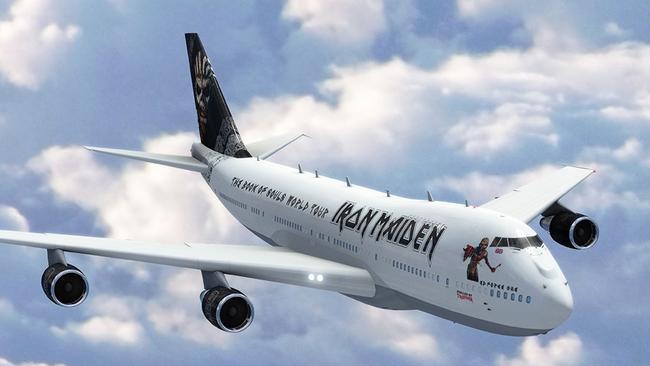Iron Maiden: Band that rocks the British stock exchange
Iron Maiden has become a British business behemoth.

A man who urged the world to Bring Your Daughter … to the Slaughter and more famously to Run to the Hills, belting out both numbers to crowds of long-haired, leather-clad headbangers, is perhaps the least likely defender of the corporate jet culture.
But Bruce Dickinson knows what he is talking about. Iron Maiden frontman he may be, he is also a veteran commercial pilot and captain both of industry and Ed Force One, the band’s heavily customised 747-400, and he argues a strong business case for “Flight 666”.
“Touring is an expensive business,” he says. “It costs a huge amount of money to pay the crew to sit on their arses waiting for the freight to arrive.”
Or, to put it another way, packing hundreds of tonnes of gear and scores of crew on to the bespoke aircraft means that Iron Maiden can add dozens of shows to a global tour and reduce costly downtime. Between April 16, when the band played in Los Angeles, to May 18, when the Book of Souls tour hit Cape Town, Maiden played 11 shows in Japan, China, New Zealand and Australia. This would have been totally unfeasible without Ed Force One.
The other benefit is marketing. The jet, which appears on airport screens as Flight 666 and features its zombie-like mascot, Eddie the Head, on its tailfin, “is the world’s largest billboard. People see it and they just go mad.” A point proved when he and it land at East Midlands airport in full view of the Download Festival taking place next door. Hundreds of fans are there to greet Ed Force One, as well as the airport’s workers, out in force to take photos of the heaviest metal hull in the business.
The aircraft may be a big beast, but it is only the most visible part of a true commercial juggernaut. On its fuselage are the symbols for some of the band’s forays outside the world of music, including Trooper beer and Legacy of the Beast, a smartphone game due to hit download stores soon.
The band’s economic credentials are easy to overlook, but across the course of a career spanning almost four decades Maiden has racked up sales in the low billions of dollars. Album sales have almost reached 100 million while the past two global tours, both seen by more than four million people, achieved combined ticket sales of $122.5 million, making the band one of the world’s largest touring acts.
That came to the fore three years ago when the London Stock Exchange issued a report that named Iron Maiden LLP as one of the 1000 companies that could drag the country out of recession. It put Maiden’s earnings in the £10m to £20m bracket.
Not bad for an act that Rod Smallwood, the band’s manager, describes as “the least corporate band in the world”. Smallwood was the brains behind Sanctuary, the record label, publishing and merchandising company that was launched by Iron Maiden and represented artistes from Dolly Parton to Morrissey and has since been absorbed by the music majors. A smaller new venture called Phantom Music that employs about 20 people at the group’s HQ in Soho has led the charge of Maiden’s heavy brigade into products not normally associated with musicians.
For Dickinson, Iron Maiden and the other ventures in beer, video games and his foray into aircraft leasing, maintenance and pilot training under the Cardiff Aviation name all centre on one economic urge.
“We are exporting. Everything about Maiden is about exports. Everything about Trooper is exports. Everything about Cardiff is about exports.”
Indeed, the stock exchange noted that Iron Maiden’s army of fans around the world gave the band a big digital presence.
Maiden’s Facebook page has almost as many “likes” as Star Wars and more than twice as many as Doctor Who. That, according to Dickinson, could be crucial as it pushes the Legacy of the Beast into China, a market that is tough to crack for British music and companies alike.
“It’s a bit like chucking seeds on to stony ground and seeing if they take. We see the game, forgive the pun, as a game-changer. It is not just getting people to play the game. The core of everything we do is the music. It is a Trojan horse. It is about getting into the music through the game.”
In an era when streaming has sucked the value out of recorded music, it is the band’s huge shows that create value.
“The music is free but the T-shirt costs you $50. It used to be the other way, but that doesn’t matter. The reason someone buys the music or the T-shirt is all to do with integrity.”
Smallwood jokes that if you could bottle “Bruce’s energy” it would be the biggest product Iron Maiden would have.
Dickinson was treated for cancer last year, when a tumour the size of a golf ball was removed from the back of his throat. Three weeks after the operation he was in Djibouti in East Africa signing a deal for Cardiff Aviation with the national airline and was soon out on tour again.
Splitting his time between being a pilot, master brewer, game developer, singer and company chairman, Dickinson could be said to have taken a leaf out of British businessman Allan Leighton’s book by going plural. Yet he quotes William Blake’s Songs of Innocence and Experience in explaining his strategy.
“My philosophy in life is never try to be too professional at anything. Then you lose the amateur in you and you lose the love for it and it becomes a job, you lose the plot. You become self-satisfied and smug.”
That, he says, is the key to the band, and the company, staying in the black, not the red.
The Times


